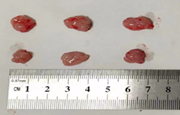SPINK4 modulates inhibition of glycolysis against colorectal cancer progression
DOI:
https://doi.org/10.17305/bb.2024.10338Keywords:
SPINK4, glycolysis, colorectal cancer, prognosisAbstract
Dysregulation of glycolysis is frequently linked to aggressive tumor activity in colorectal cancer (CRC). Although serine peptidase inhibitor, Kazal type 4 (SPINK4) has been linked to CRC, its exact linkage to glycolytic processes and gene expression remains unclear. Differentially expressed genes (DEGs) were screened from two CRC-related datasets (GSE32323 and GSE141174), followed by expression and prognostic analysis of SPINK4. In vitro techniques such as flow cytometry, western blotting, transwell assay, and quantitative real-time polymerase chain reaction (qRT-PCR) were used to assess SPINK4 expression in CRC cells. Its effects on apoptosis, glycolysis, and the cell cycle were also investigated. Finally, the impact of SPINK4 overexpression on tumor development was assessed using a xenograft model, while histological and immunohistochemical analyses characterized SPINK4 expression patterns in CRC tissues. SPINK4 expression was downregulated in CRC, correlating with poor patient prognosis. In vitro assays confirmed that overexpression of SPINK4 reduced CRC cell proliferation, invasion, and migration, while its knockdown promoted these processes and caused G1 arrest. SPINK4 also regulated apoptosis by altering caspase activation and Bcl-2 expression. Besides, SPINK4 overexpression altered glycolytic activity, reduced 2-Deoxy-D-glucose (2-DG) absorption, and controlled critical glycolytic enzymes, resulting in alterations in metabolic pathways, whereas SPINK4 knockdown reversed this effect. SPINK4 overexpression significantly reduced tumor volume in vivo, indicating its inhibitory role in carcinogenesis. Moreover, high expression of SPINK4, hexokinase 2 (HK2), glucose transporter 1 (GLUT1), lactate dehydrogenase A (LDHA), and pyruvate kinase M2 (PKM2) was observed in CRC tissues. As a key inhibitor of glycolytic metabolism in CRC, SPINK4 promises metabolic intervention in CRC therapy due to its impact on tumor growth and cell proliferation.
Citations
Downloads

Downloads
Published
Issue
Section
Categories
License
Copyright (c) 2024 Xiaodi Yang, Sen Jiang, Zhen Yuan, Jun Jiang, Mengxuan Yang, Jing Luo, Tao Ye

This work is licensed under a Creative Commons Attribution 4.0 International License.









